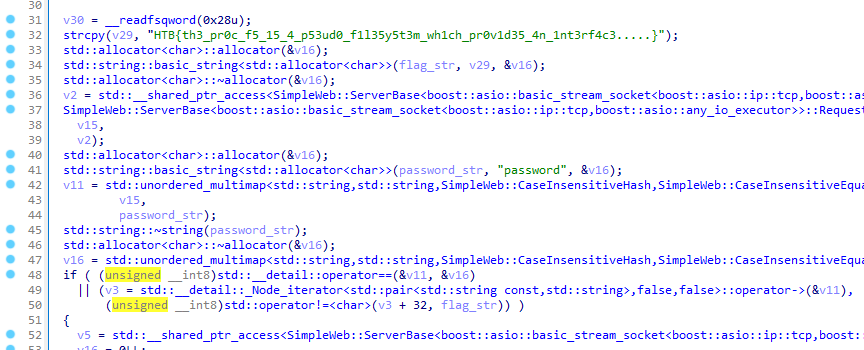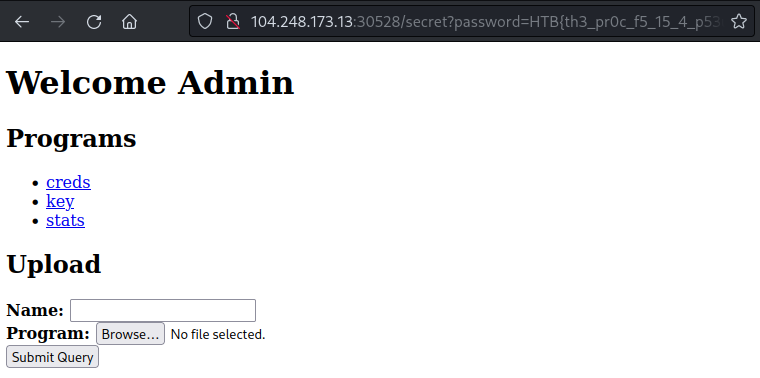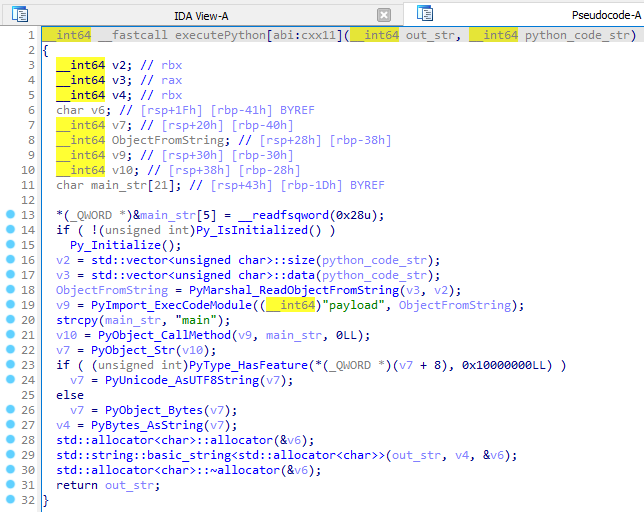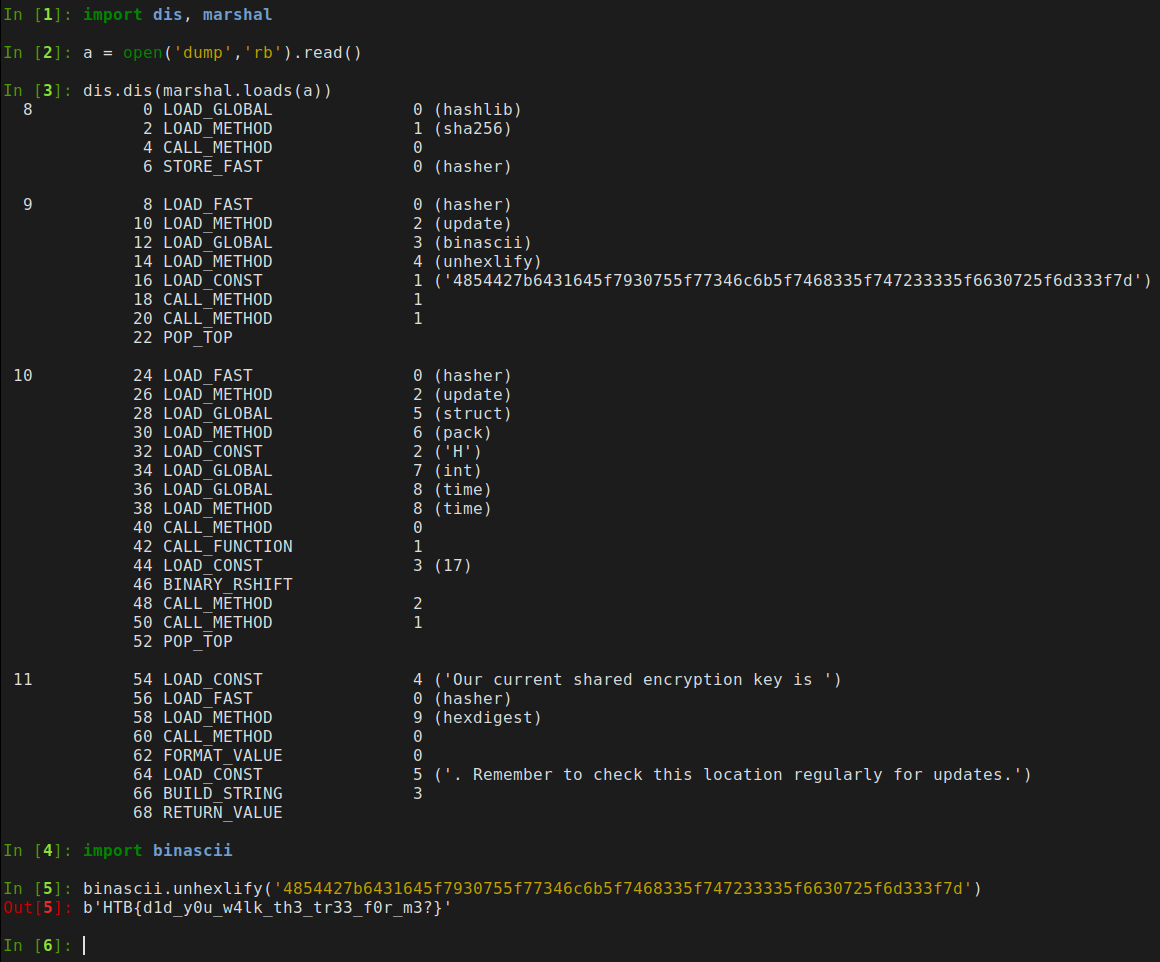HTB Business CTF 2022 Breakin
Breakin
[re, 400 points]
Previous state-hacking campaigns from these APT actors indicate that they regularly change cryptographic keys, and we believe this server is being used to coordinate them. If you can discover how the keys are being derived, then we'll be able to decrypt all their past worm communication in the network! NOTE: This challenge is intended to be solved after 'Breakout'.
From the description of the task I knew that first I should find the place where the encryption key is being shared. I glanced through each endpoint in IDA to find something interesting and I noticed, that the /secret endpoint returns the HTML page, which has some references to the other endpoints, I thought good place to start. To access the /secret endpoint, the flag from the previous task needs to be passed in the password parameter.


After that I reversed each endpoint to figure out what exactly is going on. The “Admin panel” let’s you upload the python bytecode, it adds it to the list of programs and let’s you execute it straight from the memory. By making a POST request to the /exec endpoint with a appropriate json, you could upload your program, and by making a GET request to the /exec/<program_name> you could execute it.
The python bytecode of each program is stored in the global variable program, which is a map consisting of a pairs of strings and objects of the custom class Payload, which is essentially vector of unsigned char.

From the beginning, there were already three “programs” uploaded, creds, key and stats. The key program was what I was looking for, because it returns the current encryption key.

My first thought was to somehow upload my python bytecode and dump the process memory to extract the key program bytecode and decompile it. So I started analysing further the function executePython from the execGet handler.

After reading some cpython documentation I knew that this function loads the python object from the bytecode, imports in to the payload module, executes the main function and returns the results whether it’s a string or bytes. At this point I needed to figure out how to generate a payload, which would be executed by this function, so I wrote simple code to be able to quickly test the bytecode I’ve generated.
#define PY_SSIZE_T_CLEAN
#include "Python.h"
#include "marshal.h"
#include <stdio.h>
#include <vector>
int main() {
std::vector<unsigned char> bytecode = { <bytecode> };
printf("%ld\n", bytecode.size());
Py_Initialize();
PyObject* obj = PyMarshal_ReadObjectFromString((const char*)bytecode.data(), bytecode.size());
printf("%p\n", obj);
PyObject* mod = PyImport_ExecCodeModule("payload", obj);
printf("%p\n", mod);
PyObject* res = PyObject_CallMethod(mod, "main", NULL);
printf("%p\n", res);
PyObject* str = PyObject_Str(res);
printf("%p\n", str);
PyObject* bytes = PyUnicode_AsUTF8String(str);
printf("%p\n", bytes);
char* output = PyBytes_AsString(bytes);
printf("output: %s\n", output);
Py_Finalize();
}
And compiled it using gcc (btw, it took me a fukcing while to figure out the gcc arguments and compile it).
g++ -fpie $(python3-config --cflags --embed) -o test test.cpp $(python3-config --embed --ldflags)
After a little bit of testing and trying things out I figured out how to generate the proper bytecode.
import sys
import pickle
import marshal
code = """
def main():
import sys
return dir(sys.modules['payload'])
"""
o = compile(code, 'test', 'exec')
o = marshal.dumps(o)
with open('main.dmp', 'wb') as f:
f.write(o)
for c in o:
print(hex(c), end=',')
print()
First I tried to locate the programs variable using /proc/self/maps (adding the base address and the programs variable offset) and dump the process memory. I managed to do so and I could find some strings of the program names, however it was really hard to precisely locate the address of the bytecode buffer in the memory, so after a while I dropped this path and I focused on the embedded python interpreter. I started looking at the loaded python modules and I noticed that when I list the attributes of the payload before and after execution of key program, there are some differences.
Before:

After:

I realized that the key program loads additional modules like binascii, hashlib or struct and the state of the interpreter is preserved. That’s when I came up with an idea to try to register some sort of hook, which would be executed upon every function call. The hook would try to dump the payload.main function bytecode to the file. After some research I found exactly what I was looking for.
import sys
import pickle
import marshal
# https://stackoverflow.com/questions/59088671/hooking-every-function-call-in-python
code = """
def call_tracer(frame, event, arg):
import marshal
with open('/dump','wb') as f:
o = marshal.dumps(frame.f_code)
f.write(o)
return None
def main():
import sys
sys.settrace(call_tracer)
return dir(sys.modules['payload'].main)
"""
o = compile(code, 'test', 'exec')
o = marshal.dumps(o)
with open('main.dmp', 'wb') as f:
f.write(o)
for c in o:
print(hex(c), end=',')
print()
I restarted the container, uploaded generated main.dmp, executed it and then executed the key program. After that I was able to download the dump.

I quickly decompiled it and there it was, the flag:

HTB{d1d_y0u_w4lk_th3_tr33_f0r_m3?}